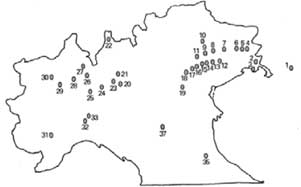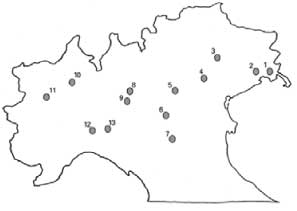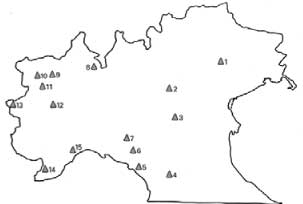Why did not Italy experience a linguistic shift from Italian Romance dialects in favor of Germanic Lombard?
For the same reason most of western Romania didn't : overhelming weight of romanisation, not only of provinces, but Barbarians as well.
How could the Germanic Lombard language become the main language of Italy similar to what Turkish is for Anatolia, English for England, Slavic for the Balkan?
Apart from having Italian being renamed Lombard and being classified as Germanic prior to scientific linguistic approach? You'd need a significantly ruined Italy to begin with, with most of post-imperial structures utterly collapsing to a point that Gothic Wars never achieved.
Could a portion of Italy become Lombard speaking while the rest stayed Latin? For example the Po Valley becoming Lombard speaking while the rest stays Romance speaking.
Depending on the definition of Italy, maybe : you could have with a strong Romance Italy (either Gothic or Byzantine, altough I think the former more likely) that would technically dominate Pannonia and parts of geographical Italy dominated by Lombards whom germanic speech would eventually dominate their polity.
In Italy proper, without utterly ruining the peninsula to heights never achieved IOTL, there's not a chance outside some valleys in the midst of nowhere.
Would Lombardic be considered a dialect of German or it's own language?
It depends a lot of its evolution : if we're talking about a Pannonian *Lombard, probably something relatively distinct, at least enough to butterfly away the IOTL definition of German.
What would the proportion of Lombard(plus other Germanics and non-Germanic but Germanophone) compared to Roman population(Romance-phone, Grecophone) would need to be to facilitate a lingustic shift? Would 5, 10, 15, 20, 25, 50% or more be needed?
Tbh I don't know. What are the known population differences (per class even) where language switch occurred?
it's not so much about proportion (altough Lombards and Barbarians never really went beyond the 5% of the provincial populations and that's including the part of Romans that joined them after they were already romanized) as the British case does points : it's as well (if not much) about the survival of late imperial structures. And Italy was, for obvious reasons, the center of post-imperial Romanity even after butchered Byzantine reconquests
Germanic speeches were maintained in Frankish Germania on these lines and connections to Germanic speaking ensemble autonomous/independent from Frankish Gaul (Bavaria, Thuringia, Alemania, Saxony, etc.), and the linguistical border along the Rhine wasn't fixed before the Xth XIth century when political-cultural centers were.
On this regard, regions of Romania that really had a chance to be "delatinized" are regions that mostly were IOTL : Illyricum, Rhineland, Britain, Raetia, etc. Arguably, part of North Italy and North Gaul could be so more deeply, given right circumstances, but that's it IMO. The sheer social-cultural gravity of Roman civilization, exerced on Barbarians since centuries at this point, was simply too important.


